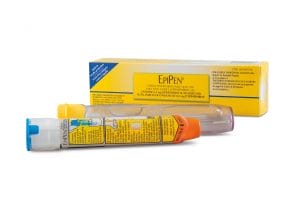Updated June 15, 2018. Branded and generic epinephrine auto-injectors distributed in the U.S. by Mylan NV are officially in shortage because of manufacturing delays, the FDA confirmed in a statement on May 9, 2018. However, the federal agency told Allergic Living that they “anticipate the EpiPen shortage to be short-term.”
“There have been reports of local supply disruptions and Mylan has reported intermittent manufacturing constraints,” said Lauren Smith Dyer, FDA spokesperson. “However Mylan continues to release the product.”
Mylan acknowledged on May 8 that U.S. consumers may experience difficulty filling prescriptions for EpiPen or EpiPen Jr. (or the equivalent generic adult or child devices).
Noting the FDA’s supply notification, on May 9, Mylan’s head of communications sent Allergic Living a statement confirming “intermittent” supply issues, but saying: “However, product is available and Mylan is currently receiving continual supply from its manufacturing partner Meridian Medical Technologies,” which is owned by Pfizer Inc. Mylan says it is expediting shipment to wholesalers when it receives devices. Yet, the statement notes: “supply levels may vary across wholesalers and pharmacies.”
Mylan’s advice to patients: If you are experiencing difficulty locating an EpiPen set, the company says to call 800-796-9526 for assistance in finding a pharmacy with the device in stock.
Another option: Kaléo, maker of the compact Auvi-Q epinephrine auto-injector, reports no supply issues with its device. Spencer Williamson, Kaléo’s president and CEO, told Allergic Living on May 7 that his company is “able to fill and is filling all the Auvi-Q order requests through our direct delivery service.”
Impax Therapeutics generic epinephrine auto-injector in the adult and child sizes are also in shortage. The FDA’s website says this is due to manufacturing delays.
The advocacy group FARE (Food Allergy Research & Education) put the pressure on the FDA, the U.S. Department of Health and Human Services and the Trump administration to take immediate action to address the national shortage of epinephrine in a statement issued May 7.
“There’s a problem out there,” FARE chief executive Dr. James Baker told Reuters. “We’ve got people who literally can’t fill their prescriptions.”
While some pharmacies still have the devices, a recent FARE survey found that more than 400 people in 45 states reported difficulties filling prescriptions for these branded and generic auto-injectors.
Allergic Living first reported on consumers experiencing difficulty filling prescriptions for EpiPen and the equivalent generic devices on April 24. Pfizer and the FDA maintained there was no national shortage of the lifesaving medication. However, until late May, stories continued to pour in from consumers whose pharmacies either didn’t have the devices, or had them on back order.
There are additionally EpiPen shortages in Canada, the U.K. and Australia.
Get more news from Allergic Living to your inbox.






